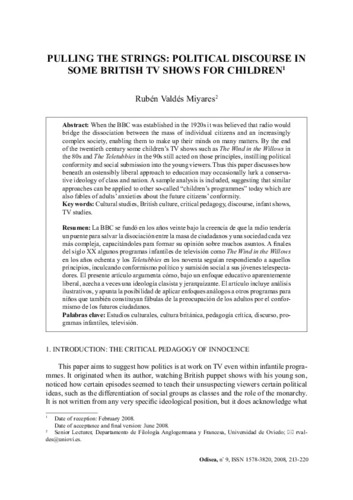Pulling the strings: political discourse in some British TV shows for children
Autor(es) y otros:
Fecha de publicación:
Editorial:
Universidad de Almería
Citación:
Descripción física:
Resumen:
Abstract: When the BBC was established in the 1920s it was believed that radio would bridge the dissociation between the mass of individual citizens and an increasingly complex society, enabling them to make up their minds on many matters. By the end of the twentieth century some children’s TV shows such as The Wind in the Willows in the 80s and The Teletubbies in the 90s still acted on those principles, instilling political conformity and social submission into the young viewers. Thus this paper discusses how beneath an ostensibly liberal approach to education may occasionally lurk a conserva- tive ideology of class and nation. A sample analysis is included, suggesting that similar approaches can be applied to other so-called “children’s programmes” today which are also fables of adults’ anxieties about the future citizens’ conformity.---- Resumen: La BBC se fundó en los años veinte bajo la creencia de que la radio tendería un puente para salvar la disociación entre la masa de ciudadanos y una sociedad cada vez más compleja, capacitándoles para formar su opinión sobre muchos asuntos. A fi nales del siglo XX algunos programas infantiles de televisión como The Wind in the Willows en los años ochenta y los Teletubbies en los noventa seguían respondiendo a aquellos principios, inculcando conformismo político y sumisión social a sus jóvenes telespecta- dores. El presente artículo argumenta cómo, bajo un enfoque educativo aparentemente liberal, acecha a veces una ideología clasista y jerarquizante. El artículo incluye análisis ilustrativos, y apunta la posibilidad de aplicar enfoques análogos a otros programas para niños que también constituyan fábulas de la preocupación de los adultos por el confor- mismo de los futuros ciudadanos.
Abstract: When the BBC was established in the 1920s it was believed that radio would bridge the dissociation between the mass of individual citizens and an increasingly complex society, enabling them to make up their minds on many matters. By the end of the twentieth century some children’s TV shows such as The Wind in the Willows in the 80s and The Teletubbies in the 90s still acted on those principles, instilling political conformity and social submission into the young viewers. Thus this paper discusses how beneath an ostensibly liberal approach to education may occasionally lurk a conserva- tive ideology of class and nation. A sample analysis is included, suggesting that similar approaches can be applied to other so-called “children’s programmes” today which are also fables of adults’ anxieties about the future citizens’ conformity.---- Resumen: La BBC se fundó en los años veinte bajo la creencia de que la radio tendería un puente para salvar la disociación entre la masa de ciudadanos y una sociedad cada vez más compleja, capacitándoles para formar su opinión sobre muchos asuntos. A fi nales del siglo XX algunos programas infantiles de televisión como The Wind in the Willows en los años ochenta y los Teletubbies en los noventa seguían respondiendo a aquellos principios, inculcando conformismo político y sumisión social a sus jóvenes telespecta- dores. El presente artículo argumenta cómo, bajo un enfoque educativo aparentemente liberal, acecha a veces una ideología clasista y jerarquizante. El artículo incluye análisis ilustrativos, y apunta la posibilidad de aplicar enfoques análogos a otros programas para niños que también constituyan fábulas de la preocupación de los adultos por el confor- mismo de los futuros ciudadanos.
ISSN:
Colecciones
- Artículos [36354]
- Filología Inglesa, Francesa y Alemana [550]
Ficheros en el ítem




